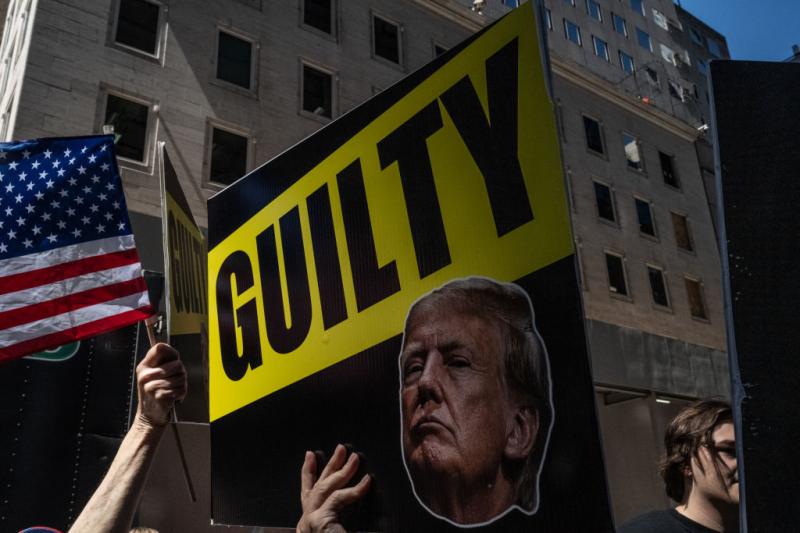What Sealed Trump's Fate | TIME
By: Kermit Roosevelt III (TIME)



IdeasBy Kermit Roosevelt IIIMay 31, 2024 1:29 PM EDTRoosevelt is a professor of constitutional law at the University of Pennsylvania Carey School of Law and the author of The Nation that Never Was: Reconstructing America's Story.
In H.G. Wells' science-fiction classic The War of the Worlds, aliens from Mars invade Earth. The military resists, but human technology is no match for Martian tripods and death rays. Within weeks, the aliens have routed the defenders and seem poised to conquer the planet. And then, mysteriously, they die. It turns out they had no resistance to the ubiquitous bacteria of our world. They were slain, Wells writes, "after all man's devices had failed, by the humblest things that God, in his wisdom, has put upon this earth."
That's what came to mind when I heard that a New York jury had convicted Donald Trump of 34 felonies. What seemed like an unstoppable force was brought low by the humblest of state laws. And while 34 felony convictions may in fact not stop Trump, the trial does tell us something important about the strengths and weaknesses of America's constitutional structure.
Back in 2016, some people hoped the Electoral College would stop Trump. Hamilton Electors, they were called. Didn't happen. Then impeachment was going to do it, not once, but twice. Again, no dice. And finally, Section 3 of the 14th Amendment, written to protect us from oath-breaking insurrectionists, came riding to the rescue only to be rejected by a unanimous vote of the Supreme Court.
These attempts to stop Trump all had a couple of things in common. The first is that they used the tools that the Constitution gives us to prevent bad people from occupying the office of the President. These tools are the heavy artillery, the sophisticated devices painstakingly crafted to protect us from crooks, demagogues, and would-be tyrants. The second is that they all failed—ignominiously.
That's not because they weren't built correctly or designed for these circumstances. Historians and constitutional scholars who weighed in on Section 3 and the impeachment tended to agree that Trump presented exactly the threat they were to counter. (The Hamilton electors scheme was a bit more fringe, but some experts supported it too.) The problem is that safeguards built into the political system are only as good as the politicians who apply them. The Constitution is no better than the Court that interprets it. The black smoke of partisanship and self-interest (perhaps all too similar to Wells' War of the Worlds) only has to corrupt a few of the governing elite for our constitutional defenses to fail.
Trump benefited from that failure, but he didn't cause it. Our constitutional system did. The electoral college, gave us Trump as President even though nearly 3 million more Americans chose Hillary Clinton. The Senate didn't just refuse to convict in the Trump impeachments; it blocked Obama's nomination of Merrick Garland and gave us the Trump supermajority Supreme Court. And if you think the Supreme Court is a defender of democracy, think again. Our noble Senate, our hallowed Supreme Court, our sacred Constitution—none of these things protected us from Trump. On the whole, they enabled him.
The reason Trump was finally held accountable was not that he ran afoul of the special rules that govern the highest reaches of our political system, the sorts of things that ordinary Americans are not subject to. (Ordinary citizens, for example, don't have to worry about impeachment, or section three, or faithless electors.) It was not that the enlightened members of our government stood up against him. It was, however, that he couldn't handle the obligations that law-abiding citizens shoulder as a matter of course in their day-to-day lives. It was that 12 ordinary Americans in an unglamorous trial courtroom ruled that he had broken the laws that everyone else has to follow.
We often think of our system of governance as defined by things the Constitution creates, structures like the Senate, the Supreme Court, or the electoral college, and processes like impeachment. But the negative space matters too—and that is the background of state law. State law, not federal law or the Constitution, is the primary regulator for most Americans. State law creates the environment in which we all live; it is, you could say, in the air we breathe.
When campaigning for the Republican nomination in 2016, Trump said that he could shoot someone in the middle of Fifth Avenue and not lose any votes. Not for the shooting, maybe. But most people would go to jail for that, and it's possible that 34 felony counts will drive home a point that some have missed. Most Americans are not involved in more than 4,000 lawsuits. They do not overstate their net worth, market questionable training programs as their own university, or run businesses that engage in tax fraud. That the most ordinary of laws finally caught up to Trump may drive home how distant the divide is between him and the regular Americans he claims to champion. State law that applies equally to all did what the special rules of the Constitution could not.




Breaking laws and ordering others to commit crimes to cover it up is criminal conspiracy. Not understanding that is mental incompetence!
Trump just added to his already large personal campaign contributions via Cohen.
A sucker is born every minute - look at all the morons who finance an alleged billionaire's lawsuit losses, I mean 'presidential' campaign funds
There was nothing ordinary about turning two misdemeanor state laws whose statute of limitations had run out; into felonies by using a federal election law (which New York has no authority to prosecute).
Time for Democrats to learn equal application under the law means; and what a fair trial really is.
[✘]
Take it up on appeal...
This apparently means nothing to you.
None of that is relevant to this case.
It is relevant to whether or not he should be running for president, or accepted by his party as a candidate.
The left got a conviction from a kangaroo court led by conflicted judge on a case brought by a corrupted DA and decided by a tainted jury.
In the scheme of things, it just made Trump stronger and more powerful and left look petty and vindictive.
The words of John Nance Garner come to mind.....this temporary "win" doesn't amount to a bucket of warm spit.
The real verdict will come on November 5th.
Yeahhhh, none of that is true.
At least you’re not saying what he did wasn’t wrong. That’s something, I guess.
baby steps
What he allegedly did was never proven beyond a reasonable doubt. We're still not sure what actual "crime" was committed.
Many people way smarter than you and I disagree with your assessment.
Oh my Lord. Yes. It was. That is literally what a trial and a guilty verdict establishes. You are suffering through some hard core denial.
You may not be sure, but our legal system is sure.
Jesus. I never thought I’d hear such nonsense.
Two trials lost and at least three more to go.
Mishandling classified documents and election interference coming up.
Does my heart good to see him finally paying for a life of crime.